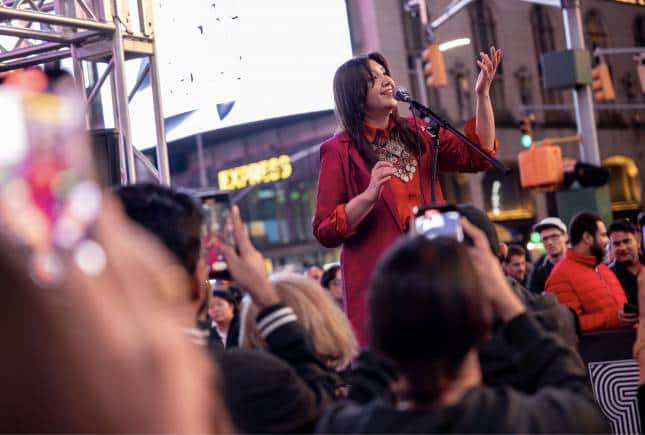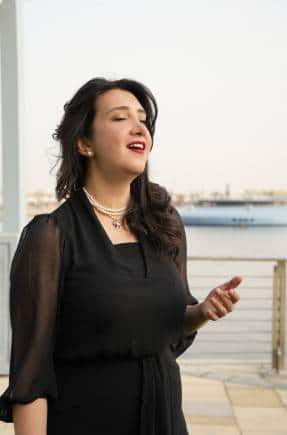



More than 200,000 people were left enthralled when Pakistani musician Zeb Bangash recently performed at the famed Times Square in Manhattan, New York. The event titled Reckoning also saw renowned artist Shahzia Sikander, Pulitzer Prize-winning composer Du Yun, and interdisciplinary artist Eddy Kwon, making this a night of music and visual arts. The singer-songwriter from Lahore, who gained popularity along with her first cousin Haniya, has been pursuing a solo career after the latter left for studies in Canada. In a candid chat, Bangash talks about her performance, her evolution as an artist and upcoming solo album. Edited excerpts:
 Zeb Bangash performing recently at Times Square, New York.
Zeb Bangash performing recently at Times Square, New York.
How was the experience of performing at Times Square?
It was surreal and magical. I am not the sort of person who likes to hang out in crowded spaces and that was a hyper-stimulated space but to be there amongst this huge group of people and perform with these amazing musicians was wonderful. The screens were lit with Shahzia’s (Sikandar) beautiful work and there was a sense of connection with the audience.
Tell us more about collaborating with artists, including Shahzia Sikandar, Eddy Kwon and composer Du Yun. What did it mean for you as a South Asian musician to be on the same platform as them?
It felt validating and lovely because of all these women who have some link to Asia. To represent South Asia in that particular collaboration felt like a real opportunity. It is amazing when you come from different backgrounds and have something to say. The beautiful thing about this collaboration was that I could really represent South Asia with my music. I was not singing pop music or diluting myself down to fit a global perspective. I was bringing my traditional perspective and training which is very much rooted in the music of South Asia.
Tell us about your earliest memories of music and then collaborating with your cousin Haniya.
Music was something I grew up with because we are a music-loving family. I grew up with a multicultural palate of music and was inclined towards the arts whether it was acting, singing or painting. We would all sing together at family occasions. Haniya and I are of similar age and so, we had no choice but to be a jodi for most of our lives (laughs). We also ended up being in college together and started making music. People started liking those songs and we would sing in our dorms. One day we recorded some songs on our desktop PCs and some three months later, they got re-circulated to us with someone commenting that these girls sing so well! Haniya and I laughed about it but didn’t take it seriously. We came back home and our songs were playing on the radio. A friend took me to meet Mekaal Hasan (guitarist who formed the Mekaal Hasan Band) and he made us record some songs. Next thing we knew my brother got us a record deal and then we were on Coke Studio! We went to India and everyone knew us.
How has your journey as a musician evolved over the years?
After I came into the music industry, I had to change my perspective. I was doing what everybody else was doing and I am not so sure that was the best thing for me. It had something to do with the way I was brought up — my relationship to the arts was very important. That helped me stay away from the stresses of success or pushing myself too much. I also started getting the sense that I am not trained in the craft and there was anxiety about how I will survive if I don’t know it. That is when I started to train and found my Ustad.
Tell us about your band Sandaara with Michael Winograd. What kind of music do you perform?
I found Michael completely by chance and we ended up bonding over the similarities and overlap of Klezmer music into which he is deeply entrenched. Klezmer music emerged out of the Eastern European Jewish tradition and I was a big fan of his. I told him it reminds me so much of Afghan music. We ended up playing a gig which had a lot of Pakistanis, Indians and Afghans and they really responded to it. We realised there is something here and so we formed a band which is based out of Brooklyn. The whole idea behind the band is to reimagine lost histories and connections.
 Zebunnisa Bangash.
Zebunnisa Bangash.
Your new album has a connection with the late composer OP Nayyar. Can you tell us about that?
OP Nayyar spent a part of his life in Lahore and just the way many Peshawaris take pride in Shah Rukh Khan, Lahoris are very proud of OP Nayyar. I have always been a huge fan of his compositions and Haniya and I actually made a song which is dedicated to him. That song was our little attempt at making an OP Nayyar style song and as fate would have it, I got the opportunity to work with Nayyar saab’s repertoire just around the time I had decided that I wanted to do my solo album. I chose a few songs and they became a part of the repertoire of my album. I worked with my producer closely and came up with our own rendition of some beautiful classics I have grown up with.
Haniya moved abroad for higher studies and you started your solo career but is there a Zeb and Haniya reunion we can look forward to?
Anything can happen, especially in my life! (laughs). I think Haniya is also coming up with an album. At present, both of us are trying to understand who each of us are individually as artists. That is what the audience expects now to hear from us.
Discover the latest Business News, Sensex, and Nifty updates. Obtain Personal Finance insights, tax queries, and expert opinions on Moneycontrol or download the Moneycontrol App to stay updated!
Find the best of Al News in one place, specially curated for you every weekend.
Stay on top of the latest tech trends and biggest startup news.